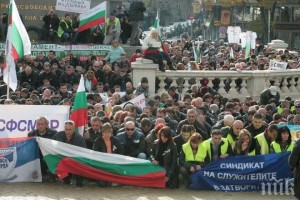POLICE on STRIKE in BULGARIA
 Bulgarian police has been on street strike for a week now. Syndicates warn that army and firefighters may join
Bulgarian police has been on street strike for a week now. Syndicates warn that army and firefighters may join
In the same week:
- Bulgaria’s ruling Socialists vow to stay despite protests
- Over 6,000 immigrants await to enter at the border with Greece
- Websites of key institutions collapsed on election day
- Two rocket launchers fired in Sofia during week of second round voting
- Bulgarian Trade Unions warned of more strikes and protests
- The police blocked Sofia in rush hour on several occasions
- Leader of a parliamentary represented party was detained and his diplomatic immunity was voted down by Parliament
- Political coalition partners quarreled in front of millions of TV viewers
- Dollar value in Bulgaria rises from 1.78 to 1.82 BGN (Bulgarian currency)
Hundreds of Bulgarian policemen, firemen and prison guards staged a spontaneous protest on Tuesday against cuts to their pensions and benefits, testing the authority of the center-right government. The demonstrators blocked major roads in the capital Sofia and held rallies in several other cities, demanding the resignation of Interior Minister Rumyana Bachvarova, who is trying to force through the changes.
Street protests have grown in Bulgaria, the European Union’s poorest member, in recent years. Voter frustration, especially with rampant corruption and organized crime, erupted in months of protests in 2013 and the country has had five governments in two years. “This is a very risky wave of insubordination,” said Tihomir Bezlov, a political analyst at the Center for the Study of Democracy. “This is an uncalculated move with unpredictable consequences.”
Staff like police who are paid from the interior ministry budget are not allowed to strike, take a second job or join a political party; in return they are exempt from paying social security contributions. But police are threatening to keep up daily protests and road blockades after negotiations with the finance ministry failed to result in the withdrawal of its 2016 budget plans. These include cutting lump sum retirement payouts to 10 times monthly net salary, from the current multiple of 20. The measures would also slash annual paid leave to 20 days from 30, and reduce extra pay linked to length of service.








Comments